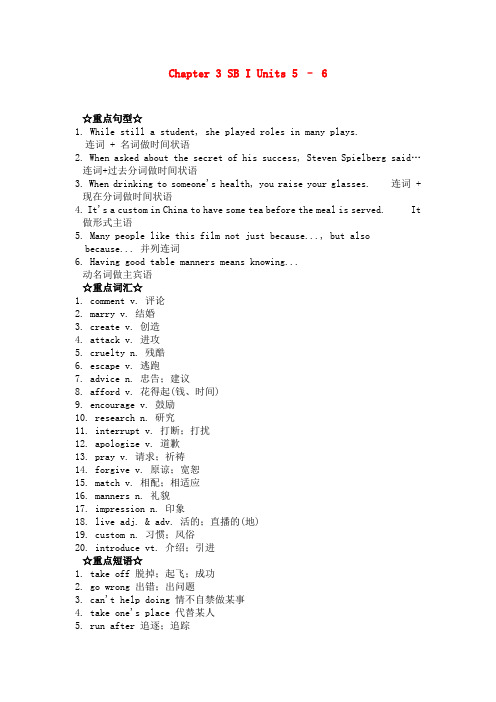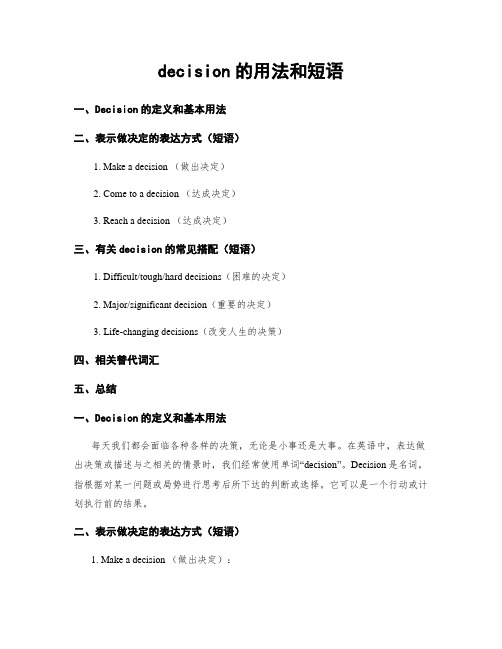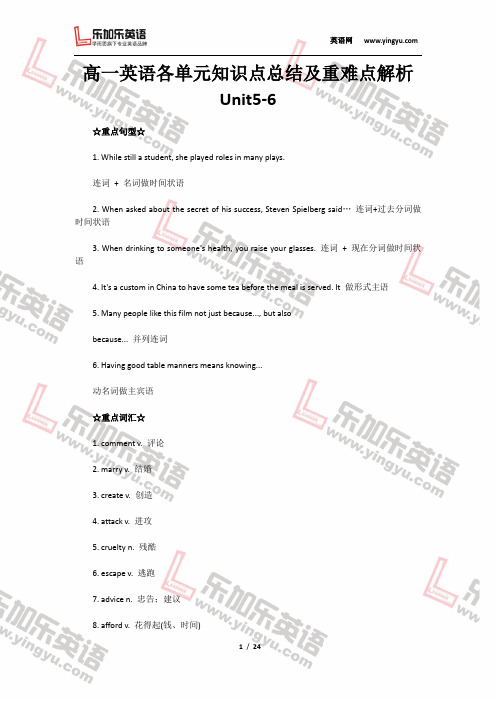determination的用法
云南省高考英语一轮复习词汇(三)

Chapter 3 SB I Units 5 – 6☆重点句型☆1. While still a student, she played roles in many plays.连词 + 名词做时间状语2. When asked about the secret of his success, Steven Spielberg said… 连词+过去分词做时间状语3. When drinking to someone's health, you raise your glasses. 连词 +现在分词做时间状语4. It's a custom in China to have some tea before the meal is served. It做形式主语5. Many people like this film not just because..., but alsobecause... 并列连词6. Having good table manners means knowing...动名词做主宾语☆重点词汇☆1. comment v. 评论2. marry v. 结婚3. create v. 创造4. attack v. 进攻5. cruelty n. 残酷6. escape v. 逃跑7. advice n. 忠告;建议8. afford v. 花得起(钱、时间)9. encourage v. 鼓励10. research n. 研究11. interrupt v. 打断;打扰12. apologize v. 道歉13. pray v. 请求;祈祷14. forgive v. 原谅;宽恕15. match v. 相配;相适应16. manners n. 礼貌17. impression n. 印象18. live adj. & adv. 活的;直播的(地)19. custom n. 习惯;风俗20. introduce vt. 介绍;引进☆重点短语☆1. take off 脱掉;起飞;成功2. go wrong 出错;出问题3. can't help doing 情不自禁做某事4. take one's place 代替某人5. run after 追逐;追踪6. win a prize 获奖7. think highly of 赞扬……;对……高度评价8. call for 需要;索取9. in all 总共10. play a role 扮演角色(作用)11. make money 挣钱12. win over 争取过来13. work on 从事,致力于14. owe success to 把成功归功于某人15. start with 以……开始16. run away from school逃学17. on the air 正在播出的18. do research 进行调查19. speed up 加速20. follow the fashion 追随时尚☆短语闯关☆下列短语都是这两个单元学过的重要短语,请你根据汉语在横线上填入一个正确的词,每个词4分,80分才能过关。
法律英语翻译中情态动词的用法

法律英语翻译中情态动词的用法法律英语翻译情态动词用法shall和shouldshall在合同文件中是使用频率最高的词,在合同文件中shall表示强制性承担法律或合同所规定的义务,在表达"应该"或"必须"做某事时,应用"shall"而不能用" must"或"should",但有时可用"will",力度比shall 弱。
Should在法律文件中往往作"if"解,只表示"如果"之意。
如:The board meeting shall be called and presided over by the Chairman. Should the chairman be absent, the vice-Chairman shall, in principle, call and preside over the board meeting.文中:两个shall,都表示有责任做,应该做之意。
Should: If 表示如果。
board meeting:董事会会议。
preside over:主持。
原文可译为:董事会会议应由董事长召集、主持;如董事长缺席,原则上应由副董事长召集、主持。
shall, may和must的否定句Shall在法律条文、合同条款处在两种情况下可以不译外,主要可以被译成"须"、"应"和"应当"等。
但shall与not或其他否定形式(如用否定词No/neigher开头的句子)连用时,一般不能顺其自然,译成"不须"、"不应"或"不要"、"不可"、"不应当",因为这几个词的意思在汉语里主要表示"建议"或"忠告";在语用上,口语色彩较重,表示"禁止"的语气不够强烈;大量既定的权威性文献表明:shall not及类似否定式短句的最通常、最恰当的译法是"不得",因为"不得"在汉语里与"禁止"一词同义,与法律英语中含shall的否定句所要表达的意思相同。
试看以下各例:1.The rights and freedoms enjoyed by Hong Kong residents shall not be restricted unless as prescribed by law. Such restrictions shall not contravene the provisions of the preceding paragraph of this Article.香港居民享有的权利和自由,除依法规定外不得限制,此种限制不得与本条第一款规定抵触。
考研英语谚语刘琦

考研英语谚语刘琦以下是20个考研英语中可能用到的谚语及其相关内容:1. Where there is a will, there is a way.(有志者事竟成)- 英语释义:If one has the determination to do something, one can find a method to achieve it.- 短语:“where there is...”结构表条件- 单词:will(意志,决心,名词);way(道路,方法,名词)- 用法:可用于引出事例,论证坚持、决心的重要性。
- 双语例句:- English: Where there is a will, there is a way. He finally achieved his dream of bing a doctor through years of hard study.- Chinese: 有志者事竟成。
经过多年的刻苦学习,他终于实现了成为一名医生的梦想。
2. Practice makes perfect.(熟能生巧)- 英语释义:Constant practice leads to perfection.- 短语:make + 宾语+ 形容词(宾补结构)- 单词:practice(练习,实践,名词或动词);perfect(完美的,形容词)- 用法:用于强调练习对提升技能的重要性。
- 双语例句:- English: As the saying goes, practice makes perfect. You should practice speaking English every day if you want to improve your oral English.- Chinese: 俗话说,熟能生巧。
如果你想提高英语口语,就应该每天练习说英语。
3. All roads lead to Rome.(条条大路通罗马)- 英语释义:There are many different ways to reach the same goal.- 短语:lead to(导致,通向)- 单词:road(道路,名词);Rome(罗马,专有名词)- 用法:在论述多种途径可达成同一目的时使用。
decision的用法和短语

decision的用法和短语一、Decision的定义和基本用法二、表示做决定的表达方式(短语)1. Make a decision (做出决定)2. Come to a decision (达成决定)3. Reach a decision (达成决定)三、有关decision的常见搭配(短语)1. Difficult/tough/hard decisions(困难的决定)2. Major/significant decision(重要的决定)3. Life-changing decisions(改变人生的决策)四、相关替代词汇五、总结一、Decision的定义和基本用法每天我们都会面临各种各样的决策,无论是小事还是大事。
在英语中,表达做出决策或描述与之相关的情景时,我们经常使用单词“decision”。
Decision是名词,指根据对某一问题或局势进行思考后所下达的判断或选择。
它可以是一个行动或计划执行前的结果。
二、表示做决定的表达方式(短语)1. Make a decision (做出决定):Make a decision是最常用也最直接表述做出决策这个意思使用。
这个短语强调主体是在经过一番深思熟虑或评估之后才作出具体决定。
例句1:It took me a while, but I finally made a decision on which car to buy.(我花了一些时间,但最终我对要买哪辆车做出了决定。
)例句2:I have been thinking about it for a long time, and now I have made my decision to quit my job.(我已经思考了很长时间,现在我决定辞职。
)2. Come to a decision (达成决定):当一个团体或一个小组共同参与并达到共识时,可以使用come to a decision来描述他们所达成的决定。
高一英语知识点总结Unit5-6(附练习)

高一英语各单元知识点总结及重难点解析Unit5-6☆重点句型☆1. While still a student, she played roles in many plays.连词+ 名词做时间状语2. When asked about the secret of his success, Steven Spielberg said…连词+过去分词做时间状语3. When drinking to someone's health, you raise your glasses. 连词+ 现在分词做时间状语4. It's a custom in China to have some tea before the meal is served. It 做形式主语5. Many people like this film not just because..., but alsobecause... 并列连词6. Having good table manners means knowing...动名词做主宾语☆重点词汇☆1. comment v. 评论2. marry v. 结婚3. create v. 创造4. attack v. 进攻5. cruelty n. 残酷6. escape v. 逃跑7. advice n. 忠告;建议8. afford v. 花得起(钱、时间)9. encourage v. 鼓励10. research n. 研究11. interrupt v. 打断;打扰12. apologize v. 道歉13. pray v. 请求;祈祷14. forgive v. 原谅;宽恕15. match v. 相配;相适应16. manners n. 礼貌17. impression n. 印象18. live adj. & adv. 活的;直播的(地)19. custom n. 习惯;风俗20. introduce vt. 介绍;引进☆重点短语☆1. take off 脱掉;起飞;成功2. go wrong 出错;出问题3. can't help doing 情不自禁做某事4. take one's place 代替某人5. run after 追逐;追踪6. win a prize 获奖7. think highly of 赞扬……;对……高度评价8. call for 需要;索取9. in all 总共10. play a role 扮演角色(作用)11. make money 挣钱12. win over 争取过来13. work on 从事,致力于14. owe success to 把成功归功于某人15. start with 以……开始16. run away from school逃学17. on the air 正在播出的18. do research 进行调查19. speed up 加速20. follow the fashion 追随时尚☆短语闯关☆下列短语都是这两个单元学过的重要短语,请你根据汉语在横线上填入一个正确的词,每个词4分,80分才能过关。
full of的用法及短语 (2)

full of的用法及短语一、Full of的用法及短语概述Full of是一个常见的英语短语,表示“充满”。
它可以用于多种情况和语境中,包括形容地点、物体、人物以及感情等。
本文将详细探讨full of的用法,并列举相关的常用短语和例句进行解释。
二、用于形容地点或场所1. Full of life - 充满生机例如:The city's vibrant streets are always full of life, with people bustling about and music playing in the background.2. Full of history - 充满历史例如:This ancient castle is full of history, telling stories that date back centuries.3. Full of natural beauty - 充满自然之美例如:The countryside is full of natural beauty, with rolling hills, colorful flowers, and peaceful streams.4. Full of laughter - 充满笑声例如:The park is always full of laughter as children play on the swings and slides.三、用于描述物体特征1. Full of flavor - 充满味道例如:This dish is full of flavor, bursting with a combination of herbs and spices.2. Full of light - 光线充足例如:The room has large windows that allow it to be full of light during the day.3. Full of potential - 具有潜力例如:This young athlete is full of potential, showing great promise in his chosen sport.4. Full of energy - 充满活力例如:The puppies were running around the yard, full of energy and excitement.四、用于描述人物特征1. Full of joy - 充满喜悦例如:She had just won a big award, and her face was full of joy.2. Full of determination - 充满决心例如:Despite facing numerous obstacles, he remained full of determination to achieve his goals.3. Full of kindness - 充满善意例如:The old lady was full of kindness, always willing to lend a helping hand.4. Full of confidence - 充满自信例如:He walked into the room full of confidence, knowing he had prepared well for the presentation.五、常见相关短语1. Full of surprises - 充满惊喜例如:The party was full of surprises, with unexpected guests and exciting performances.2. Full of praise - 赞美之词不断例如:He listened to the singer's performance with wide eyes, giving her words full of praise afterwards.3. Full of hope - 充满希望例如:Despite the difficult situation, they faced it with hearts full of hope for a better future.4. Full-of-themselves - 自以为是的例如:Some people can be quite annoying when they are full-of-themselves and think they know everything.六、总结Full of是一个非常常用的英语短语,用来形容地点、物体、人物以及感情等。
(完整版)非谓语动词(不定式)的用法

非谓语动词(动词不定式的具体用法)Step1. 动词不定式的3大语法功能(1)不定式可充当主语,宾语,表语,具有名词的功能.(2)不定式可充当后置定语或宾语补足语,具有形容词的功能.(3)不定式可充当状语,具有副词的功能..Step2.不定式的构成,即:“不定式符号to+动词原形”.Step3. 不定式的否定式,否定词一定放在不定式符号之前,即:“not/never+不定式+动词原形.一,不定式作主语的用法.特点:“to+动词原形”所形成的形式具有名词功能.名词可在句中充当主语,宾语或者表语,同理,不定式也有相同的功能.1. 不定式作主语的特点:(1)可以表示一种意愿或未完成的事.(2)谓语动词用单数.E g: To win the championship is my ambition.主语系动词表语译文:赢得冠军是我的雄心.E g: To master a foreign language is necessary.主语系动词表语译文:掌握一门外语是有必要的.E g: To become President of the United States used to be my goal.主语谓语宾语译文:过去我的梦想是成为美国总统2. 不定式作主语时,be动词之后的表语若是名词,一定是表示意愿,目的,企图等名词,用来表示尚未完成的事情.常见的此类名词有:plan(计划), purpose(目的),attempt(企图),goal(目标), aim(目的), ambition(雄心),dream(梦想), ideal(理想), wish(希望/愿望),hope(希望), decision(决定),determination (决定),proposal(提议/建议).E g: To speak perfect English is always my dream主语系动词表语译文:说一口流利的英语一直是我的梦想.3. 由于不定式短语作主语,显得主语过长,为了避免头重脚轻,达到句子平衡,把不定式短语放在句末,在原来主语的位置上“it”代替,形式上占一个主语的位置,称之为形式主语,不定式称为真正的主语.E g: It is necessary to protect the environment.形式主语系动词表语不定式作真正主语译文:保护环境是有必要的.4. 不定式作主语的两种特殊结构(1)句型:It is +adj(形容词)+of sb +to do sth.(2) 句型:It is +adj(形容词)+for sb +to do sth.特点和区别:(1)若形容词表示人的本质特征,特性,就用“of”引出的不定式的逻辑主语.A:表示人的本质特征和特性的形容词有:“good; nice; clever; wise; foolish; silly; stupid; rude; (im)polite , careless; careful; affable.E g: It is very affable of you to help me.译文:你真好帮助我.E g: It is very careless of you to lose your wallet.译文:你真粗心大意把钱包丢了.(2) 若形容词表示的不是逻辑主语的特性,而是描述对逻辑主语所做的事情,就用介词“for”,B:常见的此类形容词有:“easy; hard; difficult; heavy; necessary; impossible; important.E g: It is impossible for me to get to the destination on time inan hour.译文:一个小时之内按时达到目的地对我来说是不可能的.E g: It is very difficult for me to work out the math problem.译文:解决这个数学问题对我来说太难了.(3) 形容词表示人的特性的句子可转化成一个不定式作状语的句子,而后者则不能.E g: It is very kind of you to help me with my English可转化为一个不定式作状语的句子= You are very kind tohelp me with my English.二,不定式作宾语的用法.(1)作及物动词的宾语,该及物动词均为表示意愿,企图的动词,表示具体的或者特定的动作,或者是将来的动作.常见的动词如下:want(要); wish(希望); hope(希望); desire (欲望/渴望); intend意图;try(设法); determine(决定); decide(决定); attempt(企图); endeavor(努力); plan(计划); like(喜欢); love(喜欢); expect(期望/盼望);pretend(假装); afford(承担得起); manage(设法); prepare(准备); long (盼望); arrange(安排); promise(答应/许诺); learn(学会);dare(敢);agree(同意);start/begin(开始); fail(失败); refuse(拒绝); 等.E g: I want to take a trip abroad next year.主语及物动词不定式作宾语时间状语译文:明年我要出国旅游.E g: I intend to visit you tomorrow主语及物动词不定式作宾语时间状语译文:我打算明天去拜访你.E g: He tried to kill two birds with one stone.译文:他设法一箭双雕.E g: I expect to get a raise.译文:我渴望获得加薪.E g: I can’t afford to buy a new car.主语及物动词动词不定式作宾语译文:我买不起新车.(2)若作宾语的不定式太长,如果其后还有形容词或名词担当宾语补足语,常用“it”作形式宾语,把不定式短语作真正的宾语后置.基本句式:“主语+及物动词+it(形式宾语)+名词/形容词(宾语补足语)+to+动词原形(真正宾语)”.常见的此类动词有“find(发现); think(认为); believe(相信); consider(认为); deem(认为); feel(觉得); make(使)E g: I think it useful to learn English well.主语及物动词形式宾语宾补不定式作真正的宾语译文:我认为学好英语是很有用的.E g: I deem it necessary to apologize to others.主语及物动词形式宾语宾补不定式作真正的宾语译文:我认为向别人道歉是有必要的.E g: I deem it an honor for me to give this speech.译文:能在这里进行演讲我认为这是我的荣幸.E g: We found it impossible to finish the project in a month.主语及物动词形式宾语宾补不定式作真正的宾语译文:我发现一个月之内完成这个项目是不可能的.E g: I make it a rule to get up early.说明:Make it a rule to+v 表示“把--------当作常例/习惯于-------------”.译文:我习惯早起.E g: The teacher made it a rule to speak only English in class.主语及物动词形式宾语宾补不定式作真正的宾语地点状语.译文:老师规定在课堂上这能讲英语.E g: I felt it stupid for him to talk like that.译文:我觉得他这样讲话挺愚蠢的.(3)疑问代词:“what ; which; whom +动词不定式(to+do)”共同作及物动词的宾语的用法特点:不定式后面的动词一定为及物动词,疑问单词“what ; which; whom”及物动词或者介词的宾语.E g: I can’t decide which one to buy.主语及物动词共同作宾语译文:我决定不了买哪一个.know what to do next.E g: I don’t译文:我不知道下一步该怎么办.E g: I can’t decide whom to turn to for help.译文:我决定不了向谁求救.E g: I hardly know what to say to you.译文:我简直不知道该对你说什么.(4)疑问代词:“what ; which; whom +动词不定式(to+do)”共同作及物动词直接宾语的用法E g: Would you please tell me which course to take?主语及物动词间接宾语直接宾语译文:你能告诉我应该选哪门课程吗?(5)疑问副词:“when; where; how;whether+动词不定式(to+do)”共同作及物动词宾语的用法特点:(1)不定式后面的动词可以为不及物动词.(2)不定式后面的动词也可为及物动词,且后面有宾语.E g: He patiently showed me how to operate the computer.主语状语及物动词间接宾语直接宾语译文:他耐心地教我怎么使用电脑.tell me when to start.E g: He didn’t译文:他并没有告诉我什么时候出发.know whether to go or stay.E g: I don’t译文:我不知道是走还是留.E g: I just wonder where to spend the weekend.译文:我只是想知道该去哪里度过周末.E g: Life is long if you know how to live it.译文:若知如何使用,生命就会长久.三,不定式作表语的用法.特点:(1)主语均为表示:“意愿”或者“企图”的名词.(2)不定式作表语可换作主语.E g: His only wish at present is to sleep.主语时间状语系动词动词不定式作表语译文:他此刻唯一的愿望就是去睡觉.可转化为:To sleep is his only wish at present.E g: His goal is simply to become an excellent English teacher.主语系动词状语动词不定式作表语译文:他的目标就是当一名优秀的英语教师.E g: His resolution is to become a great scientist.主语系动词动词不定式作表语译文:他的志愿时当一名伟大的科学家.E g: My dream is to become a successful businessman.译文:我的愿望是成为一名成功的商人.E g: The problem is to find a solution.译文:问题是得找出一个解决办法.E g: Shaking one’s fist is to show one’s determination.译文:挥拳头是显示一个人的决心.E g: The purpose of yelling English is to build up your confidence.译文:大喊英语的目的是建立你的自信心.不定式作表语的2种特殊情况(1)动词不定式作主语,也可作be动词之后的表语,主语和表语的动词形式一定要对称.E g: To see is to believe不定式作主语系动词不定式作表语译文:眼见为实E g: To love her this way is to worship her.不定式作主语方式状语系动词不定式作表语译文:这样爱他就等于崇拜她.(2)在下列句型中,be动词之后的to可省略,接动词原形作表语.E g: All you have to do is (to) take a good rest.主语系动词表语译文:你所要做的就是要好好的休息.E g: All I can do is (to) wait主语系动词表语译文:我所能做的就是等待.E g:What you should do is simply (to) apologize to him主语系动词状语表语译文:你应该做的事就是向他道歉.四,不定式作后置定语的用法.相当于形容词的功能.特点:(1)动词不定式作定语时一定要放在所修饰词的后面,作后置定语.(2)动词不定式与所修饰的名词之间有动宾关系.(3)不定式后面的动词为及物动词,若为不及物动词,一定要加上相应的介词.E g: I have a pile of homework to do tonight.主语及物动词宾语不定式作后置定语时间状语.译文:今晚我有一大堆的作业要做.不定式作后置定语的特殊用法(1)不定式作后置定语可以等于关系代词作主语所引导的定语从句.E g: I have no friend to advise me.主语谓语宾语不定式作后置定语等价于:I have no friend who can advise me.译文:我没有朋友可以给我忠告.(2)不定式作后置定语可以等于关系代词作宾语所引导的定语从句.E g: I have no one to talk to主语谓语宾语不定式作后置定语等价于:I have no one whom I can talk to.译文:我没有人可以交谈.E g: There are many sights to see here.等价于:There are many sights which we can see here.译文:这里有很多的风景可看.(3)主动的不定式和被动不定式的区别. A: 如果句子的主语是要做那件事的人,就用主动形式.B: 如果句子的主语是要做的动作(或者是接受动作的人或事),就用被动式.E g: I have two coats to wash.E g: Two coats are to be washed.(4) 在:“there be ”结构中的不定式可用主动式,也可用被动式,且意思一样.E g: There is an important thing to do tonight= There is an important thing to be done tonight.(5)不定式修饰序数词一定要放在其后.A:Li was the first to arrive.B: Really? That’s not like him. He’s always the last one to arrive.A: 李是第一个到的.B: 真的吗?那可不像他的作风,他总是最后一个到.五,不定式作状语的用法.特点:不定式作状语多放在被修饰的动词,副词,和形容词之后.注意其逻辑主语必须和句子的主语保持一致.在句中充当状语,表示目的;结果或原因.(1)不定式修饰动词的用法,一定置于该动词之后.E g: We should do whatever we can to save them.主语及物动词宾语从句不定式作目的状语的用法译文:我们应该做些什么才能挽救他们呢.(2) 不定式修饰动词作目的状语的用法.特点:不定式作目的状语,通常置于动词之后,也可置于句首,用逗号与主语隔开.E g: You should work very hard to win the award.主语谓语状语不定式作目的状语等价于:To win the award, you should work very hard译文:为了要赢得这个奖项,你应该努力奋斗.E g: I’ll do everything I can to help you.(目的)译文:我会竭尽全力帮你的.E g: You’re really very kind to say so.(原因)译文:你这么说真是太好了.还有类似不定式短语有:(1)in order to+动词原形..即可放在句首,也可句末.(2)so as to+动词原形.只能放在句末.(3)only to;(4) too-------to 太-------而不能(3)with an eye to +动名词. 只能放在句中. (4)with a view to +动名词. 只能放在句中.E g: He got up early in order to catch the school bus.主语谓语不定式作目的状语译文:他早起的目的就是能搭上校车.(3)不定式修饰形容词,一般置于该形容词之后.特点:一般表示一种结果.E g: He is able to do amazing things.主语系动词表语不定式作结果的用法译文:他能成就伟业.E g: He is apt to lie to me .主语系动词表语不定式作结果的用法.译文:他爱向我撒谎.E g: She was prepared to face the music.译文:她准备好面对后果.疯狂操练:I’m determined to conquer English. 我决心攻克英文I’m determined to master pronunciation. 我决心攻克发音.I’m determined to speak good English. 我决心说好英语.I’m determined to become a grammar king. 我决心成为语法大王I’m determined to command a lot of words. 我决心掌握大量词汇.I’m determined to write beautiful articles. 我决心写出漂亮文章.I’m determined to communicate with the world. 我决心与全世界沟通.(4)不定式修饰副词,一定置于该副词之后. 特点:一般表示一种结果.E g: He is old enough to go swimming alone.主语系动词表语状语(副词)不定式作结果的用法. 译文:他长大了,足以单独一个人去游泳.五,不定式作宾语补足语的用法.(1)具有使役动词意味的及物动词,加上宾语之后,要用不定式短语作宾语补足语.此类动词有:1) cause/get 促使-----------;2) lead引导--------说明:‘加上宾语之后,可接to引导的不定式短语,但此时to视为介词,接动名词作其宾语”;3) allow/permit允许------4)advise 劝告---------5)persuade说服----------6)enable使能够----------7)tell告诉-------8)beg/ask请求--------9)order命令---------10)want/wish/expect/intend期望---------11)force 迫使----------------.12)encourage鼓励-------.E g: The sad story caused him to cry.主语及物动词宾语不定式作宾语补足语译文:这个悲惨的故事使他哭了.E g: His timely help enabled me to finish the project in advance.主语及物动词宾语不定式作宾补时间状语译文:他及时的帮助使我能提前完成这个项目.allow me to smoke in the office.E g: They don’t主语及物动词宾语不定式作宾补地点状语译文:他们不允许我在办公室里吸烟.E g: I ask my students to yell English every morning.主语及物动词宾语不定式作宾补时间状语译文:我要求我的学生每天早上都大喊英语.E g: My parents want me to become a great lawyer in thefuture.译文:我的父母希望我将来成为一位很棒的律师.E g: The boss forces his staff to work like a dog for him.译文:老板强迫员工为他拼命干活.E g: My teacher encouraged me to try again.译文:我的老师鼓励我再试一次.(2)使役动词或者是感官动词,动词不定式作宾语补足语“to”要省略.巧记不定式作宾补省略“to”的两大规则A:“注意让‘买客’听听看看这块表有啥感觉不带“土”B: 五看(see; watch; notice; observe; look at); 三让(let; make; have);两听(hear; listen to); 一感觉(feel); 一发现(find); 半个帮(help).1)感官动词,宾语补足语接原型动词,表示已发生的事实..若出现在被动语态中,“to”要还原.E g: I noticed a thief slip into my room just now.主语及物动词宾语省略不定式原型动词作宾补时间状语译文:我刚才注意一个贼溜进我的房间了.E g: I never heard him speak English.译文:我从未听过他说英语.E g: The man was seen to leave the accident.(被动语态中不定式要还原)译文:有人看见他离开事故现场.2)使役动词(make/ let/ have)的具体用法.{1}“make”的常见用法. 若出现被动语态时“to”要还原.※make +宾语+宾补(形容词)E g: The news made me happy.主语及物动词宾语形容词从当宾语补足语.译文:这则消息使我很开心.※make+宾语+宾补(省略“to”的动词原形).疯狂操练 E g: My mother made me walk the dog. My father made me sweep the floor. My grandmother made me wash the dishes. My grandfather made me buy him cigarettes. Everyonein me family made me do something yesterday. I really enjoy helping other people.译文:我妈妈让我去遛狗.我爸爸让我擦地板.我奶奶让我洗碗.我爷爷让我给他买烟.昨天家里的所有人都让我干活了.我真的很乐意帮助他人.E g: These workers are made to work at least 18 hours each day.译文:这些工人被迫每天至少工作18小时.{2}“let”的用法. 很少出现被动语态中.※Let’s +动词原形. 让我们一起-------------------------E g: Let’s have dinner together tonight. 译文:让我们今晚一起吃晚饭.※Let us +动词原形. 让我们一起------------E g: Let us help Tom clean the room. 译文:让我们大家一起帮助汤姆打扫房间.※Let sb++动词原形. 让某人做某事.E g: Let me help you. 译文:让我来帮助你. {3}“have”的用法. 很少出现被动语态中.※have +宾语(人/)+宾补(过去分词充当)表示:请某人做某事※have +宾语(物/)+宾补(过去分词充当)表示:可以用来主语的遭遇或经历,并不是故意让某事发生的.特点:1) 作宾语补足语的动词与宾语之间是被动关系.2)该动作常不属于主语的动作.E g: I had my hair cut yesterday主语使役动词宾语过去分词作宾补时间状语译文:我昨天理的发.E g: Please have the boy taken to the station.译文:请找人把这男孩带到E g: The old man had his leg broken when he fell off the bike.译文:那老人从自行车上摔下来时把腿摔断了.※have+宾语(人/)+宾补(动词原形)表示“让某人做某事”E g: The director had his assistant pick up some hot dogs for the meeting.译文:主管让他的助理为这次会议准备一些热狗.※have+宾语(人/物)+宾补(动名词)表示:“让某人或某事不停地,或者一次又一次地进行某一动作.E g: He had us laughing all through. 译文:整顿饭期间他让我们笑个不停.六,不定式充当独立主格的用法.特点:不定式可以在句中充当独立成分,用来说明说话人的态度,对全句进行解释常见的有:“to be frank; to be honest; to tell the truth; to be blunt”等E g: To tell the truth, I have no money with me today.译文:我今天一分钱也没有带.E g: To be frank, you need to lose weight.译文:坦白说,你真的需要减肥.E g: To be blunt, that’s a stupid idea.译文:老实说,这想法真愚蠢.七,原型不定式的特殊结构.下列为与原型不定式连用的特殊结构.这些结构经常出现在各类英语考试中,务必要牢记.1): do nothing but +动词原形. 除了-----,无所事事.E g: He did nothing but eat all day.译文:他整天什么也不做,只是吃.分析步骤如下:第一步:句中的but 可视为并列连词,连接对等且形态相同的词类did,即He did nothing but did----------.第二步:我们知道do/does/did用于肯定句中,可视为强调性的助动词,之后要接动词原形.试比较:未强调前: He works hard. 他用功. 强调后:He does work hard. 他的确很用功.第三步:因此,在He did nothing but did----------中,did之后要接动词原形.即He did nothing but did eat all day.第四步:并列连词but之后相同的词类可以省略.本句中第一个did为不及物动词的一半过去时,而第二个did则为强调性的助动词,虽然性质不一,但外形相同,故第二个did可省略,即:“He did nothing but eat all day”.2): Choose/expect/want/desire nothing but to+动词原形.E g: He wanted nothing but to sleep. 译文:他什么都不要,只想睡觉.3): I have no choice but to+动词原形. 除了-------我别无选择.E g: I have no choice but to wait for the result.译文:除了等待结果我别无选择.4): be interested in nothing but+动名词/名词. 除了-----对什么也不感兴趣.E g: He is interested in nothing but singing.译文:他除了唱歌外,对什么都不感兴趣.5)enjoy nothing but+动名词/名词. 除了-----------对什么都不喜欢.E g: I enjoy nothing but dancing.译文:我除了跳舞外什么都不喜欢.6)cannot but+动词原形=cannot help/stop/ resist+动名词=cannot help but+动词原形.意思为:“不得不/忍不住-----------------”.E g: When I heard the story, I couldn’tb ut laugh/I couldn’thelp but laugh. 译文:我听到这个故help laughing/I couldn’t事,忍不住笑了出来.八,在下列含有to的动词短语中to 是介词的有,注意:“介词后面要接名词、宾格代词、动名词”如下:“1)be used to----------习惯于-------; 2)devote--------to献身于-------;3)get down to-------开始、着手-------;4)lookforward to-----期望、期盼;5)object to-----反对;6)be opposed to-----反对; 7)pay attention to-------注意、关注; 8)stick to---------;9)apply------to集中精力、专注坚持10)accustom-------to使------习惯于;11)help oneself to ------请随便------”等.E g: You should pay more attention to your health.译文:你应该多加注意身体.疯狂操练:You should pay more attention to your pronunciation. 你要多留意你的发音.You should pay more attention to your kids. 你要多留心你的孩子.You should pay more attention to your teeth. 你要多注意保护牙齿.You should pay more attention to your family.你要多关心家人. You should pay more attention to your schoolwork.你要多花心思在学业上.You should pay more attention to our environment.我们应该多关注保护环境.E g: She applied herself to learning English.译文:她刻苦学习英语.E g: You must accustom yourself to getting up early译文:你必须习惯早起.E g: I’ve been looking forward to hearing from you.译文:我一直期望收到你的来信.疯狂操练:Help yourself to something to drink. 你自己随便喝点什么,别客气.Help yourself to something to eat.你自己随便吃点什么,别客气.Make yourself at home. 别拘束.Sit down and relax for a while.坐下来放松一下.My home is your home.我的家就是你的家.。
determined的用法及短语

determined的用法及短语篇11.深度解析:Determined 的多样用法与精妙短语同学们,今天我们来深入学习一个非常重要的单词“determined”。
它的词性主要是形容词,意思是“坚决的;坚定的;果断的;确定的;下定决心的”。
首先,让我们看看“determined”常见的用法。
其中,“be determined to do sth.”是一个很常用的结构,表示“决心做某事”。
例如,“He is determined to learn English well.”(他决心学好英语。
)这里的“is determined”表示一种坚决的态度,强调他学习英语的决心非常坚定。
再来看一些包含“determined”的典型例句。
“She has a determined look on her face.”(她脸上带着坚定的表情。
)在这个句子中,“determined”作为形容词修饰“look”,生动地描绘出她的表情所传达出的坚决。
“determined”在不同的语境中有着灵活的运用。
当我们描述一个人的性格特点时,可以说“He is a determined person.”(他是个有决心的人。
)来强调其性格中的坚定特质。
在描述某个行动或计划时,“The team made a determined effort to win the game.”(这个团队为赢得比赛付出了坚定的努力。
)这里“determined effort”突出了努力的坚决和不退缩。
在使用“determined”时,有一些重点和易错点需要大家注意。
重点在于理解其表达的坚决、果断的含义,并能够准确地运用相关的短语和结构。
易错点则在于不要与类似的单词如“decided”混淆,虽然它们都有“决定”的意思,但在具体用法和语境上还是有所不同的。
总之,“determined”这个单词在英语中有着丰富的用法和重要的地位。
希望同学们通过今天的学习,能够更加熟练和准确地运用它,让我们的英语表达更加生动和准确!篇21. Deep Analysis of the Various Usages and Common Phrases of 'Determined'Dear readers, today let's embark on an exciting journey to explore the rich and diverse world of the word 'determined'.As an adjective, 'determined' primarily means having made a firm decision and being resolved to do something. It often describes a person's state of mind or attitude. For instance, "She is a determined woman who never gives up easily." Here, 'determined' modifies the noun 'woman', highlighting her strong-willed nature.One common phrase related to 'determined' is 'be determined to do sth.' It indicates a strong intention and commitment to carry out a particular action. For example, "He is determined to pass the exam this time." This phrase emphasizes his resolute determination towards achieving the goal of passing the exam.Another common phrase is 'determined effort'. It refers to a sustained and purposeful attempt to achieve something. Say, "Through determined effort, she finally achieved her dream." This shows that her success was the result of her consistent and unwavering efforts.Now, let's compare 'determined' with some similar words. 'Resolute' is quite similar in meaning, but 'determined' often implies a more active and ongoing process of decision-making and striving, while'resolute' suggests a more fixed and unwavering quality. For instance, "The resolute soldier stood his ground" and "The determined athlete trained hard every day."To sum up, mastering the usage of 'determined' is of great significance. It allows us to express a person's firm determination and willpower accurately. In various fields such as study, work, and personal growth, being able to use this word appropriately can help us convey our thoughts and intentions more precisely.Whether you are writing an essay, having a conversation, orexpressing your goals and aspirations, the word 'determined' and its related phrases can add color and clarity to your language. So, keep practicing and make it a part of your active vocabulary!Hope this article has been helpful to you all. Keep learning and improving your English language skills!篇31.深度解析:determined 的多样用法与丰富短语在英语的学习中,“determined”这个单词具有丰富的内涵和多样的用法。
- 1、下载文档前请自行甄别文档内容的完整性,平台不提供额外的编辑、内容补充、找答案等附加服务。
- 2、"仅部分预览"的文档,不可在线预览部分如存在完整性等问题,可反馈申请退款(可完整预览的文档不适用该条件!)。
- 3、如文档侵犯您的权益,请联系客服反馈,我们会尽快为您处理(人工客服工作时间:9:00-18:30)。
determination的用法
摘要:
1.概览determination 的含义和用法
2.determination 作名词的用法和例句
3.determination 作形容词的用法和例句
4.determination 作动词的用法和例句
正文:
一、概览determination 的含义和用法
"Determination"是英语中一个多义词,它可以作为名词、形容词和动词使用。
在英语中,determination 通常表示决心、果断和确定性。
二、determination 作名词的用法和例句
作为名词,determination 表示"决心"或"果断"。
它可以指一个人在实现某个目标或完成某个任务时表现出的坚定决心。
例句:
- She showed great determination in completing the task.(她在完成任务时表现出了极大的决心。
)
- His determination to succeed was an inspiration to us all.(他追求成功的决心对我们所有人来说是一种鼓舞。
)
三、determination 作形容词的用法和例句
作为形容词,determined 表示"坚定的"或"决绝的"。
它通常用于描述一个人在面对困难或挑战时表现出的坚定态度。
例句:
- She is a very determined person and never gives up.(她是一个非常坚定的人,从不放弃。
)
- He has a determined spirit and always perseveres in the face of adversity.(他有着坚定的精神,总是在逆境中坚持不懈。
)
四、determination 作动词的用法和例句
作为动词,determine 表示"决定"或"确定"。
它通常用于表示对某个事物或情况的决定或确定。
例句:
- The court determined that the defendant was guilty.(法院裁定被告有罪。
)
- The company determined to expand its operations into new markets.(公司决定扩大业务,进入新市场。
)
总结:
"Determination"在英语中是一个多义词,可以作为名词、形容词和动词使用。
作为名词,它表示决心或果断;作为形容词,它表示坚定的或决绝的;作为动词,它表示决定或确定。
